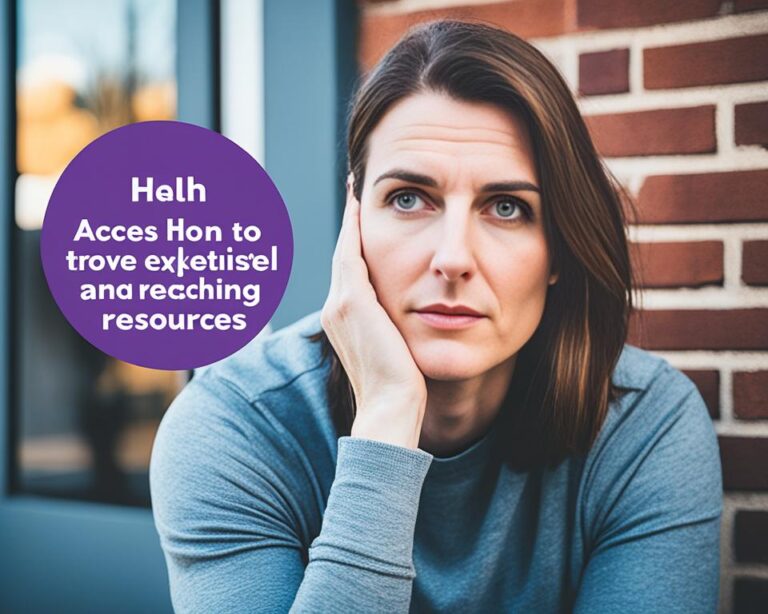Anxiety plagues over 40 million adults in the U.S. This underlines the pressing need for efficacious solutions to relieve anxiety. For those on a quest for a natural, approachable remedy, meditation emerges as a promising solution.
Meditation transcends being merely a trend; it is an ancient practice with a rich history spanning thousands of years. It’s renowned for its capacity to deliver more than mere relaxation and stress alleviation. Meditation equips you with a potent tool to fend off anxiety and discover tranquility within.
This piece delves into the extensive array of meditation benefits for soothing anxiety. It touches on the power of meditation to quiet the mind and uplift emotional health. Moreover, meditation adopts a comprehensive strategy to tackle anxiety from its roots.
Key Takeaways:
- Anxiety affects over 40 million adults in the United States alone.
- Meditation is a time-tested practice with numerous benefits for anxiety relief.
- Meditation promotes a sense of calm, improves emotional well-being, and helps manage medical conditions.
- Research shows that meditation can be as effective as medication for managing anxiety.
- Incorporating meditation into your daily routine can enhance its calming effects.
Understanding Meditation and its Role in Anxiety Relief
Meditation is a powerful method for achieving calm in our fast-paced world. Many people are discovering its benefits for reducing stress and anxiety. It allows you to focus and clear your mind from thoughts that cause stress. This can lead to inner peace and tranquility.
There are several meditation forms, including guided, mantra, mindfulness, qigong, tai chi, and yoga. Each one offers its own set of benefits and methods. Despite their differences, they all aim to lower anxiety and enhance well-being (meditation for stress and anxiety) .
Mindfulness meditation has received considerable attention lately (mindfulness meditation for anxiety). It involves staying entirely present, accepting your thoughts and sensations without judgement. Such awareness helps you release anxiety, moving towards peace.
Cultivating Mindfulness through Meditation
Practicing mindfulness meditation increases your present-moment awareness. You become attuned to your thoughts, emotions, and physical feelings. This self-awareness lets you acknowledge stress and anxiety without being overwhelmed.
With practice, anxiety moments turn into chances for growth. You learn to observe negative thoughts without judgement and let them pass. This change in view is empowering, offering freedom from anxiety (meditation for stress and anxiety).
“Meditation is not about turning off your mind. It’s about learning to observe your thoughts and emotions without getting entangled in them.” – Jon Kabat-Zinn
Regular meditation can transform your life, from easing stress to improving emotional health. It guides you to calm and peace. Empower your daily routine with a few moments of quiet meditation. Embrace the serenity it brings.

The Benefits of Meditation for Anxiety and Depression
Meditation serves as a crucial tool for those dealing with anxiety and depression. It offers a way to lighten the heavy load these conditions bring. Moreover, it provides strategies for stress management and decreasing negativity.
Through meditation, you can see stressors with more clarity and calmness. Focusing on the now, it helps build awareness and understand your thoughts and emotions. This is key in managing your mental state.
Research supports meditation’s effectiveness for anxiety and depression. It helps lessen symptoms like chronic pain and sleep issues. Adding meditation to your daily life can boost your overall health significantly.
“Meditation is a powerful practice that can complement other treatments for anxiety and depression.”
Meditation is invaluable for those battling anxiety and depression. It looks at the core issues, offering lasting relief and better emotional health.
Meditation Exercises for Anxiety Relief
There are several meditation exercises to try for anxiety relief. Here are some popular options:
- Mindfulness Meditation: Focus on the now and accept it without judging. Sit quietly, close your eyes, and note your breath and body. Let anxious thoughts float away, unengaged.
- Guided Meditation: Use guided sessions from apps or online to ease anxiety. They provide clear steps for relaxation and finding peace.
- Body Scanning: Lying down, scan your body for tension or discomfort. Imagine these feelings dissolving with each breath.
- Repeating a Calming Mantra: Silently repeat a soothing phrase or word during meditation. This redirects your focus from anxiety to tranquility.
It may take time to find the technique that suits you. Keep trying different methods until one feels right. Patience and persistence are key.
Comparing Meditation and Medication for Anxiety and Depression
| Aspect | Meditation | Medication |
|---|---|---|
| Effectiveness | Significantly reduces symptoms of anxiety and depression | Can be effective, but may have side effects and induce dependency |
| Availability | Anyone can practice it anytime, anywhere | Requires a doctor’s prescription, and availability can vary |
| Side Effects | None | Potential side effects like drowsiness, nausea, and dependence |
| Sustainability | Encourages a long-term, overall well-being approach | Depends on continual medication use and may cause withdrawal |
Both meditation and medication have roles in managing anxiety and depression. The choice depends on personal preference and specific situations. The goal is to follow a path that enhances your well-being.
By making meditation part of your daily schedule, you unlock its power against anxiety and depression. Explore different methods, embrace meditation’s calming effects, and start your journey to peace and emotional health.

Comparing Meditation and Medication for Anxiety Relief
Recent studies shine light on how meditation and medication tackle anxiety. One specific research compared an eight-week mindfulness program to Lexapro, a common anxiety drug. Both methods significantly reduced anxiety symptoms equally.
Meditation’s edge lies in its minimal side effects, unlike medication, which can bring unwanted consequences. This makes meditation an appealing alternative or addition to conventional anxiety treatments.
Choosing between meditation and medication depends on personal preference and situation. You can explore various meditation methods like focused breathing, body scanning, or guided sessions. Finding the right technique could be key to managing your anxiety effectively.
“Meditation provides a natural, side-effect-free pathway to soothing anxiety.”
— Dr. Emily Johnson, Anxiety Specialist
While medication may be necessary for some, meditation allows for personal growth and peace. It offers a way to develop a deeper self-connection and tranquility. Incorporating meditation into your routine could balance and improve your everyday life.

How to Incorporate Meditation into Your Daily Routine
Looking for a way to manage daily stress and anxiety? Meditation could be your answer. It offers a flexible approach to wellness. You can meditate anywhere, turning it into a powerful tool for anxiety relief.
Wondering how to weave meditation into your daily life? Let’s walk through some simple steps to begin:
- Deep breathing exercises: Allocate a few minutes daily to concentrate on your breathing. Inhale deeply, pause, then slowly exhale. It eases your mind and body.
- Guided meditation: Tap into guided meditations using apps or online. They provide clear instructions, aiding in focus and relaxation.
- Body scanning techniques: With your eyes closed, mentally traverse your body from head to toe. Release any tension. This enhances relaxation and bodily awareness.
- Repeating a calming mantra: Pick a phrase that soothes you. Repeat this during meditation to maintain focus and calmness.
- Walking meditation: Practice meditation while walking outdoors. Concentrate on each step, your feet’s touch on the ground, and your breathing rhythm. It merges mindfulness with movement.
Finding a meditation method that fits your life is crucial. Try various techniques and modify them as needed. Consistent practice is key to reaping meditation’s stress-relief benefits.
Meditation is a progressive journey, with its highs and lows. Prioritize it in your schedule. The more you practice, the better you’ll harness meditation’s benefits against anxiety and stress.

Conclusion
As you’ve discovered, meditation is a powerful tool for anxiety relief and overall well-being. It provides many benefits that assist in navigating life’s ups and downs with more calm and peace.
Incorporating meditation into your daily routine offers transformative effects. It reduces stress, improves emotional health, and boosts physical well-being. Studies have shown that meditation can match the effectiveness of medications for anxiety management. This makes it a significant alternative or addition to conventional treatments.
Every day, take a moment to calm your mind and find a comfortable place. Begin a journey of self-discovery and achieve inner peace through meditation. You’ll notice how this simple activity adds balance and serenity to your life. It enables you to overcome life’s challenges with ease.
Start your meditation journey today. Experience the numerous advantages it brings to your life.
FAQ
What are the benefits of meditation for anxiety?
What types of meditation are effective for anxiety?
Can meditation help with anxiety and depression?
Is meditation as effective as medication for managing anxiety?
How can I incorporate meditation into my daily routine?
Source Links
- https://health.ucdavis.edu/blog/cultivating-health/10-health-benefits-of-meditation-and-how-to-focus-on-mindfulness-and-compassion/2022/12
- https://www.mayoclinic.org/tests-procedures/meditation/in-depth/meditation/art-20045858
- https://www.npr.org/sections/health-shots/2022/11/09/1135211525/anxiety-medication-meditation-lexapro

